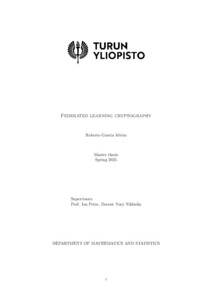Federated Learning Cryptography
García Alvira, Roberto (2025-10-24)
Federated Learning Cryptography
García Alvira, Roberto
(24.10.2025)
Julkaisu on tekijänoikeussäännösten alainen. Teosta voi lukea ja tulostaa henkilökohtaista käyttöä varten. Käyttö kaupallisiin tarkoituksiin on kielletty.
avoin
Julkaisun pysyvä osoite on:
https://urn.fi/URN:NBN:fi-fe20251029104027
https://urn.fi/URN:NBN:fi-fe20251029104027
Tiivistelmä
The main topic of this thesis is the review and analysis of federated learning, a framework for collaborative machine learning and deep learning model training. The dissertation will also link federated learning with zero knowledge cryptography, exploring how this type of cryptography can enhance the security of federated learning protocols.
The thesis will start with a historical overview to situate motivation of the development of federated learning in the actual research scene, which will be followed by a general introduction of federated learning, categorizing its different courses of action. Next, there will be a review on the privacy and security of these kinds of frameworks, exploring their main risks and threats, while also analysing what kind of security mechanisms can be implemented to combat these. Afterwards, the thesis will switch its focus to the mathematical bases of zero knowledge algorithms, specifically explaining methods based in the discrete logarithm problem over elliptic curves. These mathematical principles will help set up the grounds for the analysis of the zero knowledge algorithm Groth16, based on a protocol named ZK-SNARK. Finally, the thesis will culminate with the study of a specific novel protocol named ZKPoT, which combines blockchain, federated learning and ZK-SNARKs. Specifically, ZKPoT uses the Groth16 based ZK-SNARK as a subprotocol in the algorithm. The thesis will finish with an evaluation of how zero knowledge cryptography can enhance federated learning frameworks, fixing some of their flaws and also will explore current and future application of this type of technology in the real world.
The thesis will start with a historical overview to situate motivation of the development of federated learning in the actual research scene, which will be followed by a general introduction of federated learning, categorizing its different courses of action. Next, there will be a review on the privacy and security of these kinds of frameworks, exploring their main risks and threats, while also analysing what kind of security mechanisms can be implemented to combat these. Afterwards, the thesis will switch its focus to the mathematical bases of zero knowledge algorithms, specifically explaining methods based in the discrete logarithm problem over elliptic curves. These mathematical principles will help set up the grounds for the analysis of the zero knowledge algorithm Groth16, based on a protocol named ZK-SNARK. Finally, the thesis will culminate with the study of a specific novel protocol named ZKPoT, which combines blockchain, federated learning and ZK-SNARKs. Specifically, ZKPoT uses the Groth16 based ZK-SNARK as a subprotocol in the algorithm. The thesis will finish with an evaluation of how zero knowledge cryptography can enhance federated learning frameworks, fixing some of their flaws and also will explore current and future application of this type of technology in the real world.
